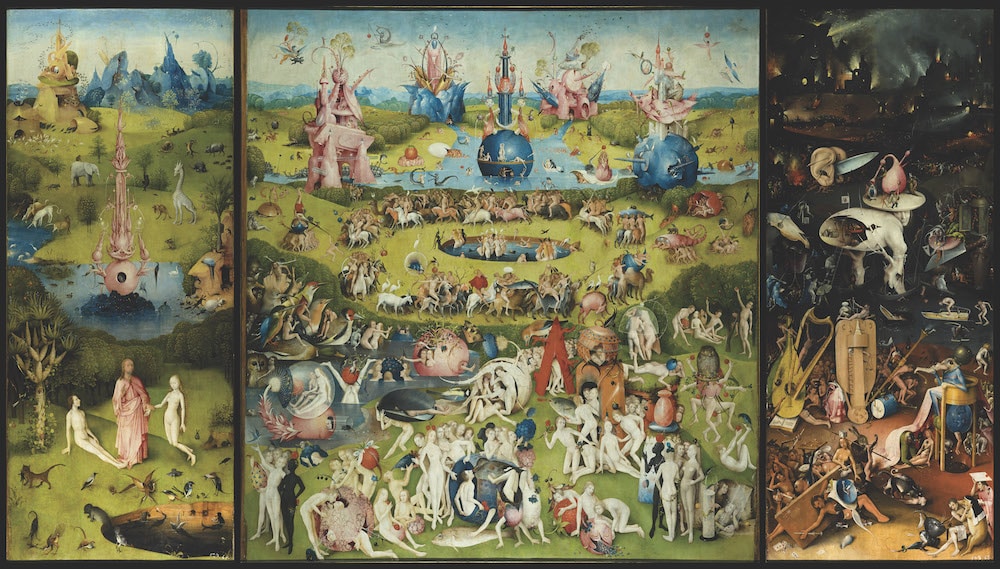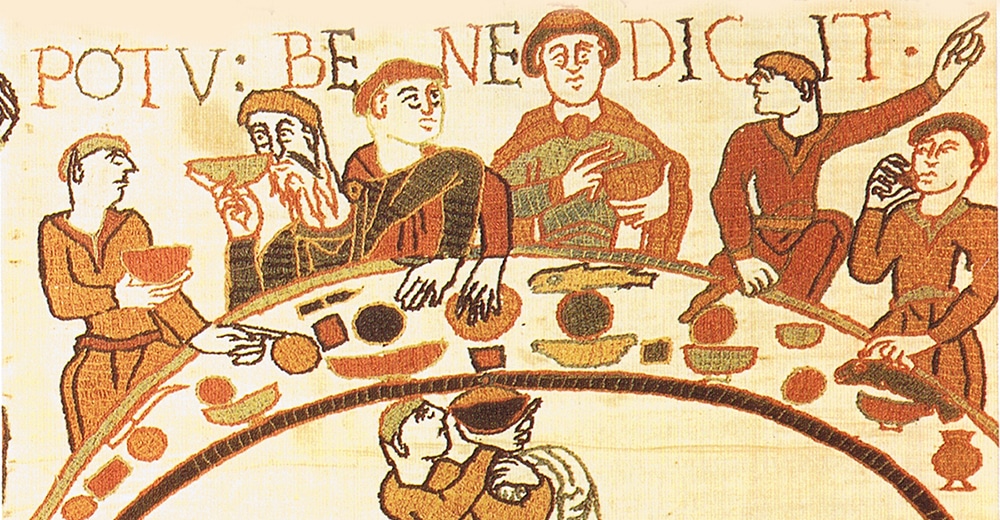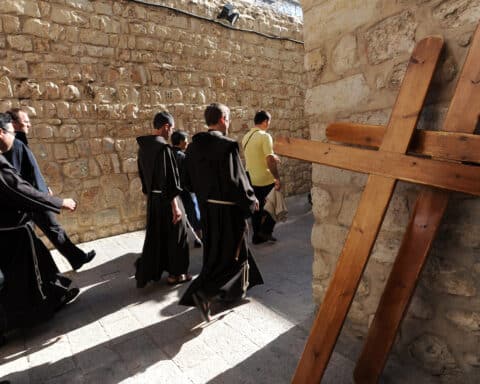There is nothing fun about Lent — dreary music, hidden artwork, somber readings, having to “give something up” — and yet I look forward to it every year. Lent, if done right, can be a truly joyful — literally joy-filled — experience. Here, I hope to share with you some of my experiences to show that Lent, and the discipline of fasting in particular, can be a source of immense joy.
Understanding our nature
It seems odd that fasting, which literally involves giving up something that we need, could be good for us. But the reason why this weird reality makes sense is because we ourselves are weird. We are in-between sorts of creatures — not pure spirit, not pure matter, but some mixture of the two. The psalmist says on the one hand that humans are just a little lower than the angels in the hierarchy of creation and that we have dominion over all the other creatures in visible creation (Ps 8), but also that we are made of dust and that our lives pass quickly away before we return to the dust we were made of (Ps 90).
The philosophical way of explaining this paradox is to point out that we are a composite of an immortal soul and a material body, that we are made of spirit (that is, out of something immaterial) and matter. The contemporary mind sometimes has a hard time with this. That we are matter is, I think, pretty obvious to us today. If you pick me up and drop me, I will fall, just like a rock would. But that we have an immaterial soul is something that today we have difficulty grasping. I think that, if we were honest with ourselves, it would be evident to us that there is more to us than our bodies. Children, for example, who are nothing if not honest, are certainly aware of this. The toddler son of a friend of mine did not want to learn to sit on the toilet because he was afraid that he would lose his “me.” Cute as this is, it also gets at something very real: You are more than your body. You have a soul.
That we have an immaterial soul is something that today we have difficulty grasping.
In fact, not only do you have a soul, you have an immaterial soul, and proof for this can be found not just in fun stories about potty training, but in reason. Try, for example, to think of a color that you have not seen before. Can you? I have never encountered a person who could (and I hope never to encounter such a person, since then I’d have to come up with a new proof!). The reason why we cannot imagine new colors is because our imagination is a sensitive power — rooted in a bodily organ — that can do nothing but conjure up images of things that we have seen before and, maybe, mix them around. You can, as Aquinas liked to say, imagine a golden mountain, but, even though you haven’t seen a golden mountain before, a golden mountain is just a composite of two things that you have seen: gold and a mountain. But a novel thing like a new color is not something that can be made by any combination of things that you’ve seen before, which is why you can’t imagine it.
What is amazing, however, is that you can understand the concept of a color that you have not seen before, even if you cannot imagine such a thing. This shows that you have two different modes of apprehension in your mind: sensitive and rational. The sensitive is bound by the temporal and the material, but the rational transcends these realms. With our reason, we can understand things that we cannot sense, things like the good and the true. With our wills, we can seek immaterial goods like peace or virtue.
Keeping in mind that we can understand the concept of a color that we have not seen before, this points to another difference between the rational and sensitive faculties in humans: We can understand what things are. Animals, which only have sensitive faculties and not rational ones, cannot. A dog does not understand what it means to be a good dog; it just likes to be praised as such. But humans are self-reflexive and can consider whether their actions really are good or not. We can think about our plans and question whether or not they will turn us into the kind of person we want to be. We can think about what it means to be good and what we need to do in order to be good.

A war within ourselves
Being spiritual clearly has its benefits, but since we are not just spiritual but also corporeal, our status as creatures of spirit and matter also has its downsides. At home, I have a cat and a toddler. The cat is much easier to take care of. When I put food in her bowl, she eats it. When she is tired, she naps. I don’t have to rock her or sing her lullabies; she just naps when she’s tired. It’s really amazing, but it shouldn’t be. Cats do not think about being tired, they just feel tired. And when they feel tired, they do what tired animals do: They sleep. But toddlers — it is no secret — do not do this. Toddlers, like the rest of us, do not just feel tired or hungry, but they also know that they are tired or hungry. Unlike my cat, when my son feels tired, sometimes this makes him angry, because he does not want to be tired. The cat neither wants nor does not want to be tired, but simply is tired. The toddler, thanks to my wife’s insistence that he learn how to say the word “no” (or rather “nuu”), now loves to register his objection to naptime vocally.
Just like a fool who squanders his inheritance and is not able to leave any money for his children, so Adam and Eve lost the gifts that they were supposed to pass on to us.
Now, obviously, toddlers grow up. They learn to recognize their urges and to control their emotions. But the thing is that all of us have a little toddler inside us. Even when we grow up, we still feel pulled in different directions by our emotions (or “passions,” as Aquinas and Augustine would call them). We often know what we should do (thanks to the rational faculties of our spiritual soul), but we don’t want to do it (thanks to our sensitive powers). As St. Paul says in Romans 7: “What I do, I do not understand. For I do not do what I want, but I do what I hate” (v. 15) Wouldn’t life be so much easier if what we wanted to do and the thing we thought we should do were the same? All of us, as spirit-matter composites, experience disharmony because of the less-than-perfect control that our souls have over our bodies. Our souls are immortal, but our bodies decay and die. Our souls seek up to the infinite good, but our bodies turn us back to the temporal and material. Why would God create us like this, to be constantly at war with ourselves?
He didn’t. Adam and Eve were created in a state of “original justice.” They were at harmony within themselves and with each other. God knew the limitations of the nature that he gave them, so he also gave them special gifts to help them live out their lives as spirit-matter composites more fully. They were in full control of their actions and never experienced any emotions that would lead them to do something wrong. Nevertheless, they sinned — they committed the original sin — and in so doing, they lost God’s special favor, and so lost it for us, too. This is why we inherit what we call original sin, which is the lack of that special favor that had enabled Adam and Eve to be in full control of themselves. Just like a fool who squanders his inheritance and is not able to leave any money for his children, so Adam and Eve lost the gifts that they were supposed to pass on to us. We are not supposed to be in a state of inner conflict. Our bodies are not bad. But in our current state, we simply lack the full control over them that we ought to have.
| Words on fasting from Pope St. John Paul II |
|---|
|
Dear Brothers and Sisters, The penitential practices suggested by the Church especially during this Lenten season include fasting This means special moderation in the consumption of food except for what is necessary to maintain one’s strength. This traditional form of penance has not lost its meaning; indeed, perhaps it ought to be rediscovered, especially in those parts of the world and in those circumstances where not only is there food in plenty but where one even comes across illnesses from overeating. Penitential fasting is obviously something very different from a therapeutic diet, but in its own way it can be considered therapy for the soul. In fact practiced as a sign of conversion, it helps one in the interior effort of listening to God. … One of the meanings of penitential fasting is to help us recover an interior life. The effort of moderation in food also extends to other things that are not necessary, and this is a great help to the spiritual life. Moderation, recollection and prayer go hand in hand. — Pope St. John Paul II, Sunday Angelus address, March 10, 1996 |
So, why fast?
So how does Lent help? During Lent, there are many traditional practices that help to heal our broken passions, the most apropos being fasting. Fasting is a wonderful practice, and if you haven’t tried it, I encourage you to do so. The practice of fasting is not a weird quirk of Catholicism — Muslims fast, Buddhists fast, Jews fast, and even the ancient Pythagoreans fasted! But for fasting to be worth it, it really has to be consistent. I would like to share with you my own experience, which involves fasting in the traditional Roman style of eating only one meal per day and two “collations” (that is, snacks, which, when combined, cannot equal a meal) if needed. This practice, which everyone is familiar with on Ash Wednesday and Good Friday, used to be required for every weekday of Lent until relatively recently (1966), and, though this is no longer a requirement, it is still the recommended practice (see Paragraph 14 of the U.S. bishops’ document “Pastoral Statement on Penance and Abstinence”).
For me, the first day of fasting is always very hard and makes me want to give up my plans to fast for all of Lent. This is why our Byzantine Catholic brethren have a season of preparation for Lent (which, for them, is quite rigorous) and why, in the Roman calendar, there used to be a season of “pre-Lent” before Lent. The point of Lent is not to torture yourself, as starting a fast cold turkey would do. Rather, preparing for Lent to ease into the fast so that you have the strength to finish what you started. I recommend this practice of easing into the fast even if you do not plan on fasting for every weekday of Lent. Ash Wednesday does not go well if you aren’t prepared for it.
If you do adjust yourself and prepare to begin a fast, then the first few days of fasting are not so bad. After three days, in my experience, things get much easier. One of the first things I notice is that I simply stop feeling hungry. This, simple as it is, is immensely liberating. I often don’t realize how often I eat as a distraction, or as a way to relieve stress. The idea to go eat something crops up in my head more often than I care to admit. With such thoughts gone, my head is clearer and I have a much easier time focusing on my work.
Once I return to my non-Lenten practice of eating whenever I feel like it, remembering what it was like to have the peace of mind that I did during Lent helps me not to give into impulses that I do not think I should give into.
The next thing that happens, once the hunger pangs cease, is that I begin to realize just how much I was relying on the pleasure of eating to make me feel happy. But once the opportunity to take recourse to eating is gone, I’m simply left with a feeling of stale dryness, as anyone who has given up a pleasurable habit has experienced. Going through this experience, though, has the benefit of giving you an opportunity to locate your satisfaction elsewhere. And, not having the opportunity to focus on something like food or another pleasure (depending on what you may have given up for Lent), means that you are freer to find your satisfaction in God.
In other words, when you fast, you feel distressed at first, but this distress is good, if you reflect on it and use it as an opportunity. First, this distress causes you to realize how much you had relied on physical pleasure for your happiness. This realization always makes me feel foolish. I know that my happiness is supposed to depend on God alone, and yet I find out every Lent just how much I had come to locate my happiness in other things, worshiping the creature rather than the Creator (Romans 1) as it were. The second thing that happens when you are distressed from fasting is that you seek rest for your soul, and without food to comfort — or distract — you, you are freer to turn to God.
After my hunger abates and I begin to think about God as the source of my happiness, I enter a state of tranquility, but it’s hard work getting there. The beginning of the fast entails going through many temptations to break the fast. Overcoming these temptations is an enormously beneficial exercise, since temptations do not cease during Easter or any other season. We always face them. Growing in one’s ability to overcome temptations is a crucial skill for any Catholic. As I have learned how to do this, I find that, during Lent, I not only stop feeling hungry but I am also not bothered by other desires. This state, which frees you up to focus on what you think you ought to focus on, is not only good in itself but has the added benefit of giving you a goal to strive for. Once I return to my non-Lenten practice of eating whenever I feel like it, remembering what it was like to have the peace of mind that I did during Lent helps me not to give into impulses that I do not think I should give into.
Now the ultimate goal in overcoming temptation and silencing unruly passions is not to become an unemotional robot. Jesus was the ideal human being, and he was quite emotional. He wept at the death of Lazarus and grew angry at the moneychangers in the Temple in Jerusalem. What we want to do is have well-ordered emotions, not to be unemotional. Good emotions help keep us focused on a task, they give us more energy to complete our tasks (this is clear from the etymology of the word: “movement from.” Emotions are things that move us), and they enhance our experience of intellectual joys, such as the contemplation of God (as the psalmist says in Psalm 84, “My heart and flesh cry out for the living God”). But the first step toward acquiring well-ordered passions is to purge ourselves of bad ones, that pull us indirections that we should not be pulled in. Getting rid of such passions allows us to evaluate our emotions more reasonably. When it occurs to you that you could indulge in a piece of cake, you can simply decide not to follow this prompting. And, if you have practiced self-denial, this decision will be easy and painless.

Preparing for Easter
These reflections, I hope, have made it clear that Lent can be a truly joyful experience. It is difficult — especially at first — but the reward comes faster than you expect. The clarity of mind and self-control that fasting brings results in a wonderful sense of peace and tranquility, and they offer a greater degree of self-control.
But the greatest thing about Lent is that it prepares you for Easter. It is no accident that in the Church’s calendar the longest fast precedes the greatest feast. The benefits are both physical and spiritual. First, physically, fasting does cause you to take greater pleasure in food, but the pleasure is appropriately moderated. Rather than being that in which you derive your happiness, the pleasure of food at an Easter feast becomes an augmentation of the happiness that you take in the resurrection of Christ. That is, not only is food more delightful, but the joy that you take in the Resurrection becomes even greater, being enhanced by the feast, without the risk of confusing the celebration with the thing celebrated.
The pleasure of food at an Easter feast becomes an augmentation of the happiness that you take in the resurrection of Christ.
And spiritually, Lent frees you up to allow God to have space to work in your heart. The deepening of your relationship with him through self-denial magnifies your Easter joy, since the more we love someone, the more we rejoice at their presence. But furthermore, rejoicing in the Resurrection of Christ helps us to look forward to our next encounter with him with greater anticipation, which itself helps us to keep things in perspective once our fast is over.
Lent is hard. We cannot — and should not — live as if it were Lent all year round. But this annual ritual is vital to the spiritual life of a Catholic, and fasting, especially, is a most appropriate activity to undertake this season. Fasting calms our passions, clears our minds, lends us greater self-control, and fosters a deeper relationship with God. If you give fasting (after Ash Wednesday) a try this Lent and find it difficult, know that it has been and can be done! Also know that it gets easier after a few days. If you find it too difficult, you can try fasting just on Fridays and Wednesdays (as used to be customary during Advent). Keep also in mind that fasting is not a competition and should not be a point of pride. The purpose is not to see what you can accomplish, but precisely the opposite, to see how far away from perfection you really are. The goal is to be more humble, to make you more amenable to the reception of God’s grace, not to make you feel proud of your accomplishments.
I wish you a holy, blessed and joyful Lent.
Matthew Dugandzic is academic dean and associate professor of moral theology at St. Mary’s Seminary and University in Baltimore.
| WISDOM ON FASTING |
|---|
|
“Do you wish your prayer to fly toward God? Make for it two wings: fasting and almsgiving” “Lenten fasts make me feel better, stronger, and more active than ever.” “Fasting makes sense if it really chips away at our security and, as a consequence, benefits someone else, if it helps us cultivate the style of the good Samaritan, who bent down to his brother in need and took care of him.” “Fasting is the soul of prayer, almsgiving is the lifeblood of fasting. Let no one try to separate them; they cannot be separated. If you have only one of them or not all together, you have nothing. So if you pray, fast; if you fast, show mercy; if you want your petition to be heard, hear the petition of others.” “Understand that of itself fasting is not a virtue. It is a virtue only when it is accompanied by conditions which render it pleasing to God.” “Through fasting and praying, we allow Him to come and satisfy the deepest hunger that we experience in the depths of our being: the hunger and thirst for God.” |





